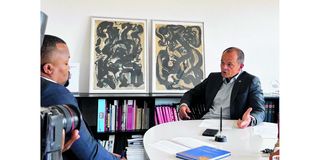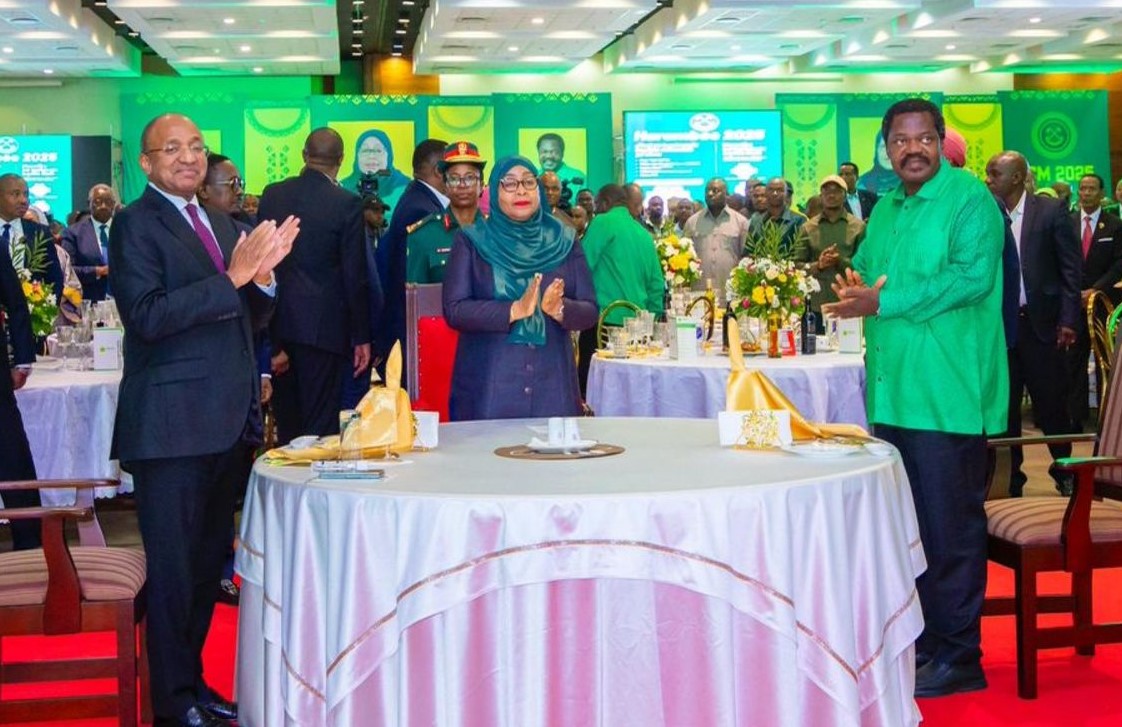Prime
Q & A: Denmark seeks stronger trade, investment ties with Tanzania, says Ambassador Kammersgaard

The Ambassador of Denmark to Tanzania and the East African Community, Jesper Kammersgaard, speaks with The Citizen reporter, Jacob Mosenda in the interview. PHOTO | MICHAEL MATEMANGA
What you need to know:
- The Ambassador of Denmark to Tanzania and the East African Community, Mr Jesper Kammersgaard, has opened up on the state of bilateral ties between Denmark and Tanzania, Denmark’s renewed Africa Strategy, regional diplomacy and the evolving global context.
- In this interview with The Citizen’s Jacob Mosenda, the envoy reflects on his first year back in Tanzania, plans to close, and then to maintain the embassy, and his vision for the future of the partnership
Question. You are marking one year since your return to Tanzania, this time as head of mission. What does this milestone mean to you personally and diplomatically, especially since you served here 15 years ago?
Answer: Personally, I’m delighted to be back in Tanzania. It’s a beautiful country, very close to my heart. Over the past year, I’ve had the chance to visit many regions, and I always enjoy discovering different parts of the country.
Professionally, this year has been both exciting and challenging.
Building a new partnership between Tanzania and Denmark takes time, and I’m impatient by nature.
Although we had more than 60 years of partnership, we started afresh in many ways, strengthening networks, rebuilding our embassy team, and developing new portfolios in trade, investment, development cooperation, and cultural exchange.
We’ve set many “ships” sailing, though most haven’t reached harbour yet, and more still need to depart.
One concrete result is Denmark’s contribution to the EU’s Green and Smart Cities Programme in Mwanza, Tanga, and Pemba —about €100 million to improve water and sanitation.
It’s a win-win initiative, combining aid, investment, and European technical know-how for Tanzania’s benefit.
Denmark’s 2021 decision to close its embassy in Dar es Salaam was reversed in 2023. What prompted the decision to close, and why was it rescinded?
In 2021, during the pandemic, the then Danish government announced the closure of our embassy in Tanzania.
That decision was short-lived, for two main reasons.
First, in 2022 a new Danish government came to power amid a changing world.
Russia’s full-scale invasion of Ukraine was a game-changer for Europe and the EU.
It underscored that the world had become more unpredictable, more polarised, and less stable. For Denmark, it was a wake-up call: we need trusted partners.
Second, Tanzania sent new signals after President Samia Suluhu Hassan assumed office in 2021.
She commissioned a review of Tanzania’s foreign policy, aiming to restore the country’s reputation as a regional leader and reliable global partner.
The revised foreign policy, launched in 2025, focuses on diplomatic engagement and the role of the private sector in development.
Those shifts, both in Denmark and Tanzania, led to the decision to keep our embassy open and invest in the partnership, for the benefit of Tanzania and Europe.
How would you describe progress under Denmark’s renewed Africa Strategy, and what are your top priorities in Tanzania?
For over 60 years, our partnership centred on development cooperation, with strong results.
But Tanzania is changing, the world is changing, and so must we.
We start with Tanzania’s own ambitions.
The country’s Vision 2050 sets clear goals: peace and stability, economic transformation, sustainable development, and achieving upper-middle-income status by 2050.
These align closely with EU priorities, especially security and competitiveness.
Our future partnership will rest on four pillars: political dialogue on issues such as peace, security, and climate; improved trade and investment relations; continued strategic development cooperation; research, student and cultural exchange.
We have a strong foundation in political dialogue, development cooperation and academic partnerships—more than €40 million in research collaborations.
But trade and investment remain too weak and require more effort from both sides.
Has the Denmark–Tanzania relationship moved beyond the traditional donor-recipient model?
That’s exactly where we want to go. Denmark needs a partner like Tanzania, and Tanzania needs a partner like Denmark.
We want a more equal partnership that reflects today’s global realities.
That means more honesty, openness, and listening, offering expertise where it’s needed, and creating win-win solutions.
We’re on that journey, but there’s still ground to cover.
As Permanent Representative to the East African Community, how does Denmark see its role in regional integration and diplomacy?
We believe strongly in economic integration. It brings progress.
We’ve seen that in Europe, and we’ve seen it in the EAC. That progress must continue.
Denmark has a long history of supporting East African integration.
We’re working with TradeMark Africa on a regional programme to help implement the African Continental Free Trade Area (AfCFTA).
The Danish government has committed over Sh40 billion to help the region mitigate the effects of the current global trade wars, with part of that going through the EAC.
You’ve seen Tanzania evolve over the past 15 years. How would you describe the changes?
The changes are striking. Driving from the airport last year, I saw flyovers, the new rapid bus transit system, the SGR station, and the Tanzanite Bridge, clear signs of infrastructure investment and economic growth.
There’s a growing middle class, more business activity, and vibrant trade even in rural areas.
In Mpanda, farmers are selling rice across the border, something I didn’t see 15 years ago.
But I believe challenges remain. Tanzania still needs to expand democratic space.
Discussions on political violence and disappearances are more open now, but their very necessity points to deeper issues of trust that need to be rebuilt.
Overall, I see progress and ambition, reflected in Vision 2050 and the revised foreign policy.
Achieving those goals will require even stronger growth, and Denmark stands ready to partner with Tanzania in that effort.
Denmark currently holds the EU Council Presidency, sits on the UN Security Council, and leads climate talks ahead of COP30. How do these roles influence your work in Tanzania?
These responsibilities help us shape global responses to challenges that are also relevant in Tanzania and East Africa.
On the Security Council, we address conflicts in regions such as the Great Lakes, the Horn of Africa, Sudan, South Sudan, and the Sahel.
Here in Tanzania, part of our job is to understand the country’s positions on these issues and relay them to our UN colleagues.
As EU Council President, we can here in Tanzania help communicate Europe’s priorities in Africa and coordinate closely with colleagues under the leadership of the EU delegation in Tanzania.
On climate change, Tanzania is leading the African Group of Negotiators to COP30 in Brazil later this year.
That gives us a unique opportunity for close dialogue between the EU and African sides—because in diplomacy, understanding each other’s priorities is essential for reaching agreements.
Looking ahead, what is your vision for Denmark–Tanzania relations?
I hope my successors will find a stronger embassy team, a robust network between stakeholders, and new strategic partnerships and agreements in place.
I would like to see stronger trade and investment ties, an expanded development cooperation portfolio, and deeper research, student, and cultural exchanges.
Our embassy is committed to working hard to build this new era of partnership between Denmark and Tanzania.



